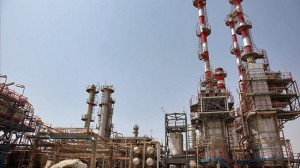 This file photo shows installations at Lavan Oil Refinery.[/caption]
This file photo shows installations at Lavan Oil Refinery.[/caption]LONDON, Nov 26 (Reuters) - Oil edged above $111 a barrel on Tuesday as investors judged the historic deal between�Iran�and world powers would bring no immediate increase in crude oil supplies from the OPEC member.
The deal halts Iran's most sensitive nuclear activity and suspends some sanctions by the West, but caps Iran's exports at the current level of about 1 million barrels per day (bpd).
That means supply concerns continue to affect the market amid disruptions to oil exports from Libya.
Front-month�Brent crude�rose 4 cents to $110.04 a barrel by 1100 GMT. It had plunged as much as $3 in the previous session but recouped most of those losses to end 5 cents down. U.S. oil CLc1 rose 35 cents to $94.44.
"At first, the market was completely taken by surprise yesterday, which led to a sell-off. But I think the market came to its senses quite quickly," said Bjarne Schieldrop, chief commodity analyst at SEB.
"It's becoming quite clear to most people in the market that there's not going to be any additional oil in the near-term and not for the next half year."
Iran is mobilising more ships to store and transport oil, aiming to keep its fields working and mitigate losses of several billion dollars a month as sanctions remain in place for at least another six months.
U.S. STOCKPILES
Oil, particularly the U.S. benchmark, was supported by expectations that distillate stocks, which include heating oil and diesel fuel, dropped by 800,000 barrels last week, indicating a pick-up in demand in the world's top oil consumer.
The expected fall is overshadowing a forecast of a rise in crude�stocks, by 800,000 barrels for the week ended Nov. 22.
Industry group American Petroleum Institute (API) will release its numbers later in the day, followed by the official U.S. Energy Information Administration data on Wednesday.
Also supporting oil is a drop in Libya's exports to a fraction of its capacity because of protests at oil ports.
Commerzbank said in a note: "Any rapid normalization of oil production in Libya remains a pipe dream after fighting broke out in the oil-rich east of the country between regular troops and militant Islamists."
By Reuters
The Iran Project is not responsible for the content of quoted articles.










